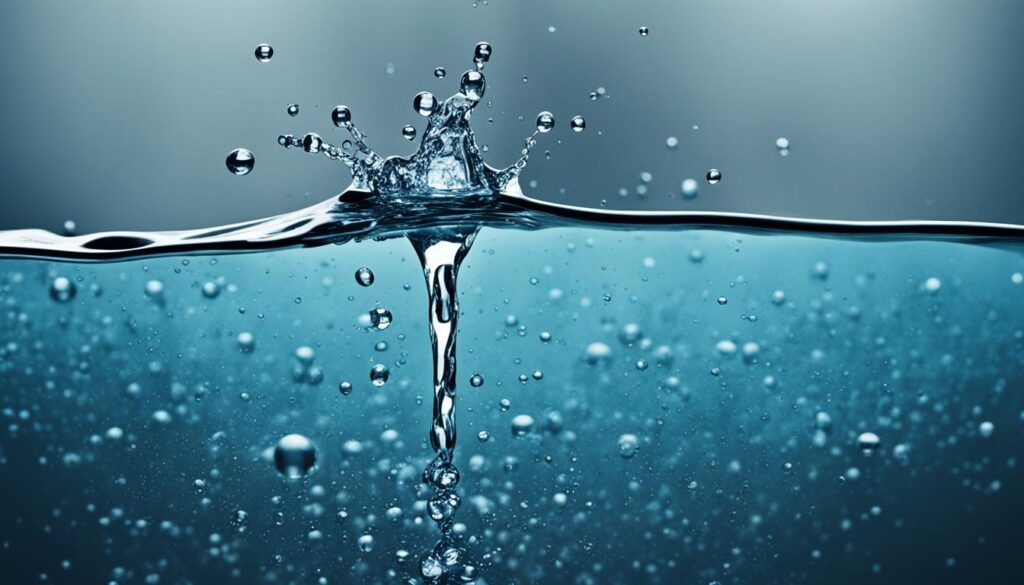Starting a water fast is both thrilling and tough. It usually lasts 24 to 72 hours and you only drink water. This guide will cover the health perks and safety notes of water fasting for beginners.
Water fasting has a long history in different cultures and religious practices. It’s now known for being good at helping with weight loss and detox. It might also lower the chances of diseases like heart problems, diabetes, and cancer by the way it affects your body.
But, starting a water fast needs to be done safely. There are risks like not getting enough nutrients and losing too much water. If you want to try this, make sure you prep well and maybe have a doctor guide you.
Key Takeaways
- Water fasting usually goes on for 24 to 72 hours.
- It might reduce the risk of certain diseases.
- Drinking enough water is very important – aim for 2-3 liters a day.
- If you plan to fast over 72 hours, or if you’re in a special health group, get a doctor’s advice.
- Autophagy from fasting helps your cells get rid of old, unneeded parts.
- Watch out for signs of too much dehydration, lack of nutrients, and low blood pressure when standing up.
What is Water Fasting?
Water fasting is when people give up eating food and just drink water for a time. This time is usually from 24 to 72 hours. Now, many do it for health and detox reasons. But, going without food for a while has always been part of spiritual and religious traditions too. Today, there are different ways of fasting. These include fasting under a doctor’s watch or just eating during an eight-hour period each day.
Definition and History
Water fasting means no food or drink except water. It has been around a long time for spiritual and health reasons. People in different cultures and religions used fasting to clean their body and spirit. For example, in India, yogis did it. So did monks in Tibet, and key figures from Christianity and Islam. It’s important to be careful when choosing to fast. Often, it is best done while under the care of a mentor or a doctor.
Common Reasons for Water Fasting
Many today try water fasting to lose weight and detox their bodies. They think it’s a powerful way to get rid of toxins and make the body healthier. There is some evidence that it may help lower disease risks like diabetes and heart disease. Recent studies showed health benefits like better insulin and leptin sensitivity. Plus, it could help lower blood pressure and activate autophagy. This is a process that gets rid of old, damaged cells, and can help reduce aging and prevent some diseases.
Water Fasting vs. Other Fasts
Water fasting is quite different from juice cleanses, intermittent fasting, or lemon detox cleanses that last up to a week. With water fasting, you only drink water, not juice or consume any calories. It’s usually 2-3 liters of water a day. Compared to detox fasting with lemon or teas, water fasting needs more thought and sometimes medical help, especially if it goes beyond 72 hours. Since there are no set rules for starting water fasting, experts suggest beginning with shorter fasts. This gives the body time to adjust, then gradually doing longer ones.
A comparative table showing differences between water fasting and other fasting methods could be very helpful:
| Fasting Type | Duration | Allowed Intake | Main Benefits |
|---|---|---|---|
| Water Fasting | 24-72 hours | Water (2-3 liters/day) | Autophagy, improved insulin sensitivity, detox |
| Juice Fasting | 1-3 days | Juices, water | Initial detox, nutrient boost |
| Intermittent Fasting (16/8) | Daily | Water, non-caloric drinks, food within 8-hour window | Weight loss, improved metabolic health |
| Lemon Detox Cleanse | Up to 7 days | Lemonade mixture, water | Detoxification, rapid initial weight loss |
Each fasting method has its own benefits and things to think about. It’s important to choose carefully. Sometimes, having a doctor oversee it is a good idea for the best results.
The Benefits of Water Fasting: A Beginner’s Guide
Water fasting means only drinking water for a set time. It brings health benefits to many, for religious, detox, and health reasons. Learning about these perks helps decide if water fasting fits your life.

Weight Loss and Ketosis
Water fasting benefits majorly include weight loss. The body goes into ketosis in water fasting. It burns fat for fuel, not carbs. This shift aids in losing fat and managing issues like obesity. Most find 24-72 hour fasts effective and safe without a doctor.
Promotes Autophagy
Autophagy from fasting means the body cleans up by tossing out bad cells. This helps lower cancer and diabetes risks. Water fasting might even prolong life in animals by kickstarting autophagy. This is why some choose it for better long-term health.
Improves Insulin Sensitivity
Water fasting helps make the body respond better to insulin. It balances key hormone levels to keep metabolism and blood sugar in check. Better insulin sensitivity means lower diabetes and metabolic disease dangers. Some improve a lot post-fasting in studies.
Potential Heart Health Benefits
Heart health and fasting go hand in hand. It helps lower blood pressure and bad cholesterol, which are big heart disease risks. Decreasing these issues improves heart health. Water fasting offers a solid path to a healthier heart.
In short, water fasting can bring ample health perks, from losing weight to cleansing cells. Even so, it’s wise to start slowly and get advice from a doctor. They can tailor fasting to your health goals, making water fasting safer and more effective.
How to Start Water Fasting Safely
Beginning a water fast takes careful planning and a clear understanding of what’s involved. First-timers need to get their bodies ready, fast properly, and then break the fast the right way. We will talk about each step to make your water fasting experience both healthy and effective.
Preparing Your Body
Starting a water fast the right way involves slow steps. Begin by eating smaller meals and trying out short fasts during the day. A common start is a 24-hour fast, drinking 2-3 liters of water during this time. Using mineralized water helps keep your electrolytes in check. Easing into the fast with a balanced, nutritious diet before it begins is also vital.
Conducting the Fast
During the fast, it’s crucial to keep drinking water to stay hydrated. This step is key in avoiding dehydration and maintaining good bodily functions. It’s best to avoid hard physical activities. A calm, stress-free environment can make fasting easier. Fasts normally last 24 to 72 hours. Pay close attention to your body and stop if you feel very uncomfortable.
Breaking the Fast
Ending a fast correctly is important to avoid refeeding syndrome, a severe reaction to food too quickly. Start with easy, nutrient-packed foods. The CDC suggests eating often in small amounts to manage your weight. Plan to have five light meals a day, including healthy snacks.
If a medical professional is guiding you, fasting with health issues is safer. Always check with your doctor before starting a water fast. This is to make sure fasting is a good fit for your health and wellness needs.
Potential Risks and Dangers of Water Fasting
Water fasting can help with weight loss and cleanse the body. But there are big risks too. These risks should not be ignored.
Dehydration and Nutrient Deficiency
Risks of water fasting include dehydration. People might drink water, but they miss the added hydration from food. It’s also easy to lack necessary nutrients, leading to health problems. Fasting for 24–72 hours without medical help increases these dangers. Long fasts can hurt your body’s processes, worsen medical issues, and lower your immunity.
Orthostatic Hypotension
Orthostatic hypotension and fasting can be dangerous. It causes a sudden blood pressure drop when you stand up. This can make you feel dizzy or faint. Even short water fasts can cause this. So, it’s important to be careful during a fast, to prevent any accidents or injuries.
Not Suitable for Everyone
Water fasting isn’t for everyone. Some groups face more risks. Fasting health warnings advise against it for kids, pregnant women, elders, and those with health issues. This practice can be very harmful for them. It’s important they talk to a doctor before considering a fast.
The dangers of water fasting must be considered. Knowing these risks and how to deal with them is key. This makes water fasting, even though it’s popular, something to think hard about.

Personal Experiences and Results
People’s stories about water fasting vary a lot. Some see great improvements in their health. However, others face big challenges.
Success Stories
For weight loss, many try water fasting and share their success stories. They talk about not just their weight, but also their overall health. For example, they say it lowers risks of some cancers or diabetes. Studies indicate fasting could lower blood pressure. It might also make the body respond better to insulin and leptin. This could help control blood sugar and how hungry we feel. All this hints at fasting’s role in fighting obesity.
Common Challenges
Not everyone finds water fasting easy. Dealing with the hardships is a real challenge. Some face fatigue, strong food cravings, and emotional struggles. There are also health risks to consider, like orthostatic hypotension. It might make existing conditions worse, including gout and eating disorders. That’s why health professionals advise caution, especially for those with health issues.
How to Overcome Challenges
To tackle the challenges of fasting, a thoughtful approach is key. A strong support network can offer motivation and help you stay on track. Being in tune with your body matters a lot. It’s important to adjust your fasting plan or stop, if needed. Start the fast slowly and gently. Also, breaking the fast with light, healthy foods is vital. These steps can lead to a positive fasting experience.
| Pros | Cons |
|---|---|
| Weight Loss | Fatigue |
| Improved Insulin Sensitivity | Cravings |
| Potential Heart Health Benefits | Orthostatic Hypotension |
| Enhanced Leptin Sensitivity | Exacerbation of Medical Conditions |
Conclusion
Water fasting could bring many health benefits. These include losing weight, better metabolic health, and possibly living longer. Research shows different fasting times can affect how much weight you lose. For instance, fasting for five days might make you lose 4% to 6% of your body weight. But if you fast 15 to 20 days, you could see a 7% to 10% decrease.
However, after the fast, how much weight you gain back is different for everyone. Some might regain everything in three months. Others might only gain back some of what they lost.
But, it’s important to be cautious with water fasting. Although it may seem beneficial at first, some effects like lower blood pressure or cholesterol could be temporary. A big concern is that most of what you lose in the process could be muscle. This shows why balance is key.
Solution? Consider intermittent fasting instead. It has solid support and brings similar advantages without the severe downsides of water fasting.
The key is to fast the right way and under supervision. First-timers should especially get proper medical advice before starting. This approach keeps the benefits up and the risks low. It makes fasting more doable over time for those interested.




